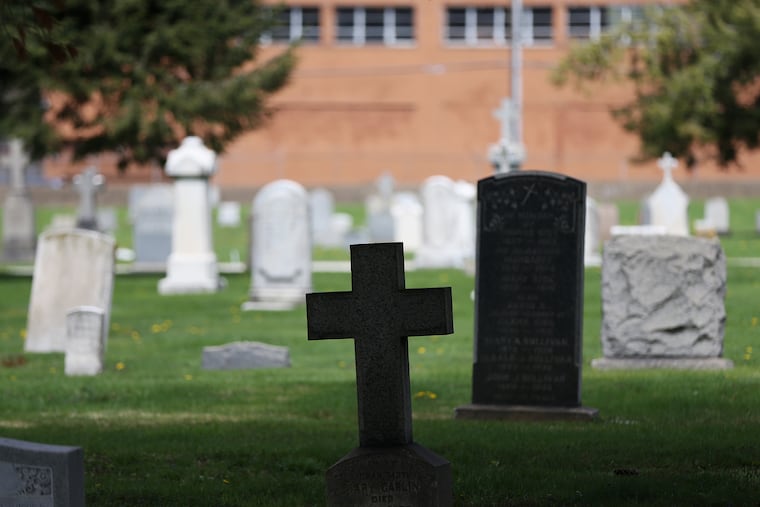How StoneMor, battered cemetery operator for Philly Archdiocese, is coping with coronavirus: ‘We’re solvent enough’
The nation’s second largest “death care” company, based in the Philadelphia suburbs, is in the midst of a turnaround led by Axar Capital.

The nation’s second largest “death care” company, based in the Philadelphia suburbs, is struggling to remake itself amid a pandemic while continuing to take a drubbing on Wall Street.
And, as the U.S. death toll from COVID-19 continues to rise, Trevose-based StoneMor Inc. says it is facing a shortage of protective gear required for its workers. The company, which operates “thousands and thousands of acres of cemeteries" across the United States, operates nearly 90 funeral homes and 320 cemeteries, including 13 belonging to the Archdiocese of Philadelphia.
“Personal protective equipment is an issue for us. Our front-line employee and embalmers need a lot of PPE,” said Keith Trost, StoneMor’s vice president of finance. “We‘re facing the same issues health-care workers are.”
Despite the growing COVID-19 death toll, funeral-services providers have not been exempt from the business disruptions. Funeral homes, including those run by StoneMor, have seen their income shrink in part due to government-mandated social distancing.
Memorial services that once gathered hundreds of mourners are now capped at 10 people, including clergy, dramatically cutting income for rental of chapel space and payments for other services. Many of those last no longer than 15 minutes. In one instance, StoneMor resorted to drive-by services with an open casket displayed under a tent.
Other factors are cutting into the bottom line. Most funeral homes aren’t doing embalming. Burials are being deferred. The number of cremations, which generate less revenue, is up.
“We are beginning to see a down-tick in the average funeral spend," said StoneMor’s Trost. “People don’t necessarily do all the bells and whistles because they’re not necessarily picking the headstone today.
Trost said funeral homes are storing the remains for longer, as families wait for restrictions to be lifted so they can hold proper services. Still, StoneMor said that typically, it can store the remains for only 45 days. “At some point, burial needs to take place.”
Even as StoneMor is trying to readjust to the coronavirus reality, the company is having one of the worst months of its publicly traded history. In late March, Investors Business Daily dubbed StoneMor one of the market’s “25 Weakest Links” after a string of losses and wondered whether it would survive the stock market crash.
Despite the investor skepticism, StoneMor told The Inquirer that it has the financial resources to continue operations at its cemeteries.
“We’re solvent enough to maintain the properties,” Trost said.
StoneMor’s troubles predate the coronavirus pandemic, which has killed more than 25,000 people in the U.S. as of Tuesday. (About three million people die in the United States yearly.) In past years, the firm has faced criticism and lawsuits over cemetery upkeep and its financial practices.
Though all burial-related stocks are languishing, StoneMor’s stock has fallen to a record low.
Five years ago, the stock was valued at more than $30. Since June 2019, it has languished at about $2. In recent weeks, it’s become one of the worst performers on the New York Stock Exchange. On Tuesday, the stock (STON) closed at $0.60.
Looking for a turnaround
StoneMor is in the midst of pursuing an aggressive turnaround strategy. In the last two years, it has replaced nearly all senior managers. In search of efficiencies, it outsourced all of its grounds-keeping and leased its equipment to Moon Landscaping.
During the last year, a New York-based hedge fund became StoneMor’s majority owner.
Axar Capital — which specializes in distressed assets — has pumped millions into reviving StoneMor’s prospects. Founded by Andrew Axelrod, the hedge fund now owns 52% of StoneMor and aims to transform the company by selling off selected cemetery properties.
Last month, StoneMor moved to sell properties in California for $49 million, pending regulatory approval. In January, the company sold properties worth $33 million. Its new focus is on a core of a dozen states in the Southeast and Mid-Atlantic, including Pennsylvania and New Jersey. StoneMor is still interested in buying more properties, another company official said, but only in states where it already has a sizable presence.
StoneMor is considered the second-largest operator in the highly fragmented funeral industry. Service Corporation International (SCI) dominates the field. The top five companies control about 20% of the market
StoneMor’s share totals about 1.5% of the $21 billion market, according to 2019 figures, with 320 cemeteries and 90 funeral homes in 27 states and Puerto Rico.
In the 12 months ended Dec. 31, 2019, the company recorded $290 million in revenue, down from $316 million the year before.
Axar began building a stake in StoneMor in 2018. As of last Dec. 31, it held more than 11 million shares.
“We have been pleased with the progress management is making less than a year into a significant operational turnaround following our June 2019 recapitalization," Axelrod said in an interview this week with The Inquirer.
The company is “focusing on industry best practices to gain operating efficiencies, tactical outsourcing and overhead reduction,” Axelrod added. He said investors would come back as these initiatives yield results.